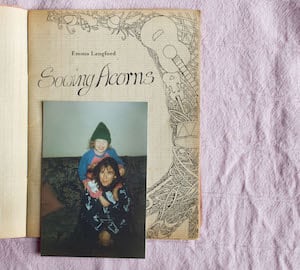
Emma Langford – Sowing Acorns
Independent – 18 September 2020
Just one listen to Sowing Acorns and any thoughts of potential ‘difficult second album syndrome’ will be immediately consigned to the bin. Emma Langford has delivered a mature, assured and eminently listenable album, frothing with melodic charm and lyrical intrigue.
Personal, intimate and self-reflective, the baker’s dozen songs occupy a place in which emotions are empathetically exposed, offering up an honest and introspective view of how she sees her place in the world at the present time, both as an artist and a woman. Thus themes such as loss, vulnerability and broken relationships fuel the central motif of female empowerment and strength which underpins the album.
Drawing on the expertise of the Grammy-nominated producers Graham Murphy & Chris O’Brien, the team responsible for Quiet Giant, her highly acclaimed debut album, Sowing Acorns was recorded between Golden Egg Studios in Laois and The Production Suite in Dublin, and what a superb job they have done too for Emma, who, lest it be forgotten was the winner of the ‘Best Emerging Artist’ prize at the inaugural RTÉ Radio 1 Folk Awards in 2018.
As a statement of intent, opening track Birdsong is a powerful affirmation of strength and rage against those in society who wish to promote self-hate and censure self-esteem and positive self-belief. Delivered a cappella, it is a brave choice with which to open the album, but one which is to be applauded. Emma’s initial solo vocal builds, as gorgeous harmonies from a choir of Niamh Farrell, Alma Kelliher, Jess Leen, Sadhbh O’Sullivan, Cari Q and Ruth Smith, along with the faintest hint of percussion, provide a celestial sound to accompany the incisive lyrics
‘But for now I belong to no beast, man, or thing,
My own self is my own I am strong as my bones …
‘Til your eyes find me I am strong as my bones
An immediate change of mood, both lyrically and sonically, comes with Sailor’s Wife, a fine re-examination of the age-old theme of the female standing, looking out to sea, pondering on the return of her lover, albeit with a twist here. The up-tempo rhythmic shuffle of the tune engages the listener, together with emotive strings, which are sympathetically mixed, never overshadowing Emma’s soaring vocals.
Further nautical references are to be found elsewhere on the release. He Came From the Sea, for example, which this writer interprets as an extended metaphor, the subject matter relating to the need to support the most vulnerable in society and written in honour of the men in Ireland struggling to reach out and talk. Such is the beauty of Emma’s delivery here that one could be forgiven for thinking that the song is a newly-discovered Joni Mitchell track. A further example, the Celtic-infused The Winding Way Down to Kells Bay, serves not only as a paean to the places and people of the Iveragh Peninsula but is also in memory of her granduncle Eamon Langford, and touching exploration of personal grief.
The sheer stylistic array and diversity of sounds on the release is a further feature which not only emphasises her skill as a songwriter, Emma is responsible for all lyrics and melodies, but also provides great variety through ever-changing emphases in terms of light and shade, tempo and arrangement. Thus, an old Irish air, the instrumental Port Na bPúcaí, (The Fairy Lament), is immediately followed by title track Sowing Acorns, written as a lullaby, but possessing an energetic chorus and delightful spoken-word interludes from Vanessa Ifediora who reads from her Off-White Sheets.
Written as an homage to women who have been inspirational in her life, and “For the tireless campaigners who have made Ireland a place worth living in”, Mariana is a string-led piece which pulsates with melodic charm. The fact that profits from its sale as a single will go to Safe Ireland, supporting people sheltering from domestic violence, is also to be commended.
One has barely to scratch the surface to discover the autobiographical nature of the remaining songs on the album. Whether it’s ambition, as in the exquisite harmonies on the unaccompanied Song For My Younger Self, written to the 12-year-old who lost her voice and her confidence, ‘I work every day to make her proud, her voice was broken so I sing aloud’, the sweeping expanse of the soulful Ready-O, entreating the virtues of self-faith and belief, or the equally gorgeous jazz-infused Goodbye Hawaii with its tastefully understated pedal-steel and a touch of voice-trumpet, the writing appears to come naturally.
The ability, and willingness, to admit and share mistakes shows a high level of self-awareness, and these traits are explored in the final three songs. Demon, Darling, musically a Laurel Canyon vibe with added violin, considers the need to address your own demons, whilst in Free to Fall, Emma self-reflects on bad choices made, but lessons leant, in a sparsely beautiful song featuring only vocal and acoustic guitar. Addressing broken relations in the final track, You Are Not Mine, (This Song Isn’t About You, You Lying Bollix), is a somewhat acerbic realisation, as Emma notes, “I suppose it’s also about independence though, you don’t belong to anyone, and they don’t belong to you. You have to fill up your own space in the world.”
‘And if we go out dancing tonight, I want you to know that it’s alright,
You can dance with whoever you want to, it’s fine,
I am not yours, and you are not mine.’
Whilst this album may well have been a cathartic process for Emma, for the listener it is a strikingly good experience; her ability to weave musical magic shines throughout. This is a positive step on her journey, it would make sense to step aboard and enjoy not only this, but the rides to come.
Facebook: facebook.com/EmmaLangfordMusic
Twitter: @ELangfordMusic
Photo Credit: Conor Kerr

